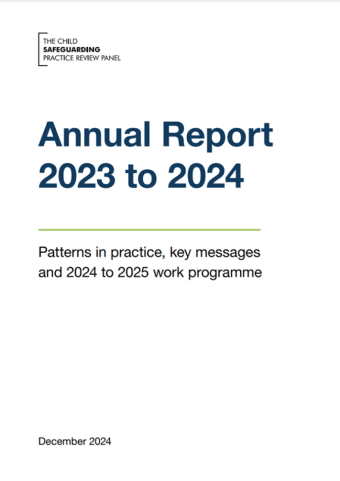12th December 2024
Today, The Independent Child Safeguarding Review Panel has published its annual report which consolidates the learning from serious incidents where children have died or suffered serious harm. Each case represents a child whose life was cut short or seriously harmed. Many were abused or neglected, inside and outside their families – the learning contained in this report cannot change the past, but it has the potential to change the future.
The findings and recommendations will be relevant for all health visiting practitioners, managers and system leaders – they help us to make sense of what happened to these children and consider how we can improve the ways that we work to protect children in the future.
The report identifies national patterns in practice through analysis of 330 serious safeguarding incidents (Serious Incident Notifications (SINs)) which occurred between 1 April 2023 and 31 March 2024, and 82 Local Child Safeguarding Practice Reviews considered by the Panel in this same period.
Importantly, careful analysis of multi-agency practice when things have gone so catastrophically wrong in children’s lives can shed light on the experiences of the broader group of children who need safeguarding. The analysis also highlights good practice and recognises that very many practitioners bring enormous skill and imagination to safeguard children. It also demonstrates the strains and stressors being faced by families and across the health and care sector, with diminished capacity in services that can impede our collective ability to protect children.
In addition to key data about the children and their families who are the focus of reviews, the report spotlights three themes:
- Safeguarding children with mental health needs
- Safeguarding pre-school children with parents with mental health needs
- Extrafamilial harm
Key findings:
In 2023 to 2024 there was an 18% reduction in the number of notifications, particularly those relating to serious harm. The drivers for this reduction need to be interrogated further, at both a national and a local level.
During the review period, almost half of the incidents were due to the death of a child, and almost half were due to serious harm. The age distribution of children was very similar to previous years, with under 1s still experiencing the most harm, representing over a third of all incidents.
Notably, in a quarter of incidents, at least one parent or relevant adult was reported to have either a physical, mental health-related, learning or developmental disability, a substantial increase from the previous year. In just over half of the incidents, at least one parent was reported to have one or more mental health conditions, and in 43% of reviews, there was a parent with an addiction to or misuse of alcohol and/or substances.
Of particular relevance to health visiting, the spotlight theme on “Safeguarding pre-school children with parents with mental health needs” reported the following findings:
- Parental mental health was often overlooked as a potential risk factor when considering parents’ capacity to care for their children.
- There tended to be an over-focus on visible contextual factors, such as home conditions, with less consideration of mental health, despite indicators of both historical and current deteriorating mental health.
- Findings also identified a lack of effective communication between and within statutory and non-statutory services, particularly adult services and child services.
- Reviews and literature identified a critical absence of support for parents with mental health needs or conditions who have children between the ages of 1 and 5, with research predominantly focusing on pre-natal and perinatal mental health.
Linked to this, some reviews identified children not being brought to their health appointments which might, in turn, have been associated with the parents’ mental health and other challenges they were facing at that time. Critically and sensitively exploring the reasons for non-attendance might have assisted in better engagement by understanding and unblocking any manageable barriers for parents.
These issues highlight the challenges for practitioners and agencies when trying to successfully engage parents in discussing the impact of these issues. Mental health needs can fluctuate between periods of stability and instability, improvement and deterioration. This, along with the presence of other stressors or vulnerabilities, means practitioners and services may need to be as flexible and accommodating as possible when working with parents in these circumstances.
Commenting on the Report, Hilda Beauchamp, iHV Mental Health Lead, said:
“The sobering spotlight on ‘Safeguarding pre-school children with parents with mental health needs’ flags the recurring need for professional curiosity, better inter-agency communication, and greater consideration of the complex intersecting factors that impact parental mental health. Some good practice by health visitors in identifying and managing risk to babies and children related to parental mental health is noted, but this report leaves us in no doubt that more can be done to protect our most vulnerable little ones.”
The Report contains key learning points for direct practice and learning for strategic leaders and managers – as well as reflective questions to assist practitioners, managers and leaders in considering practice in their area.








